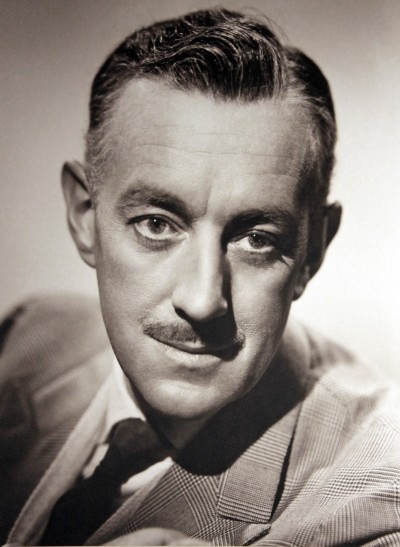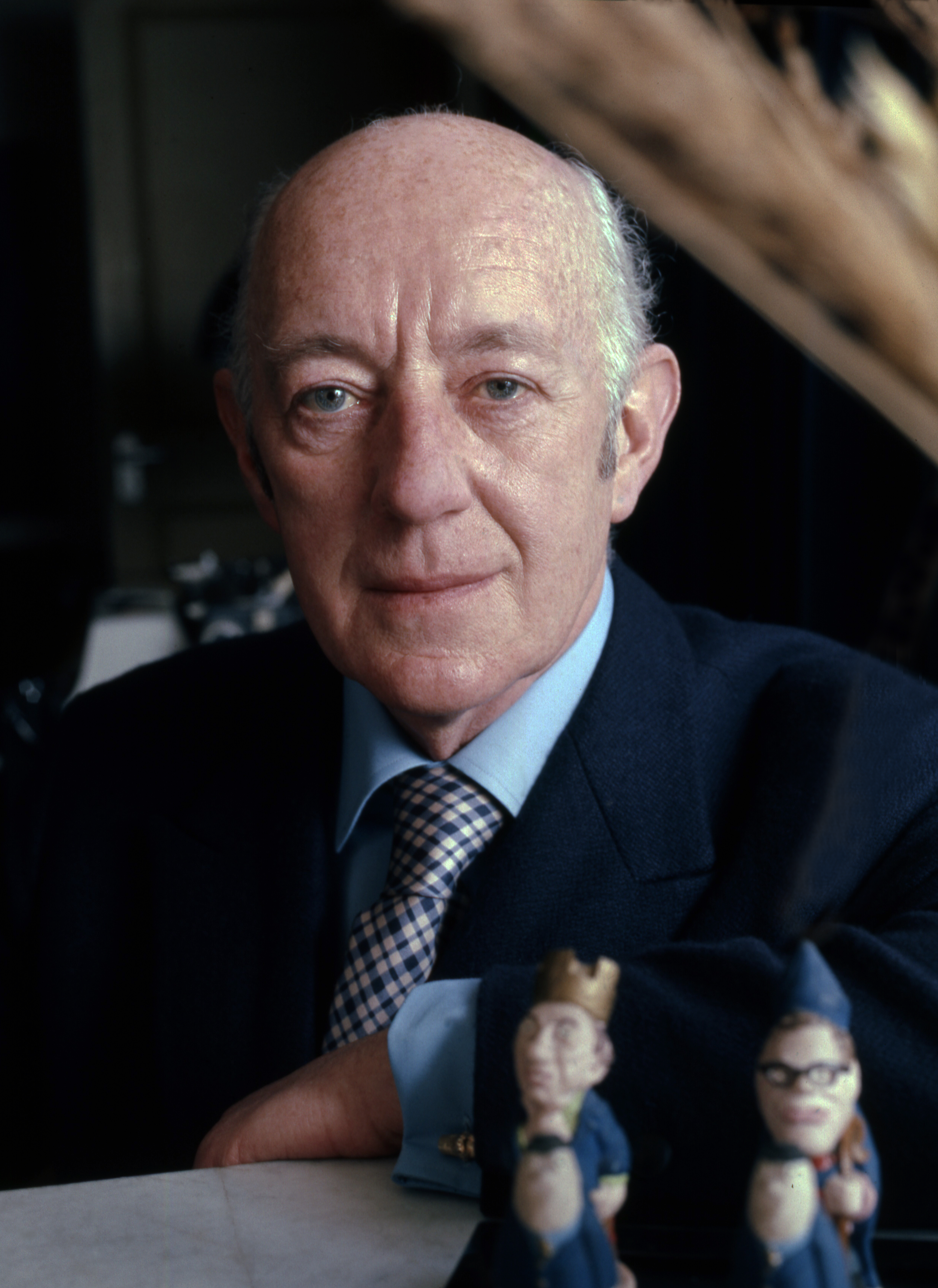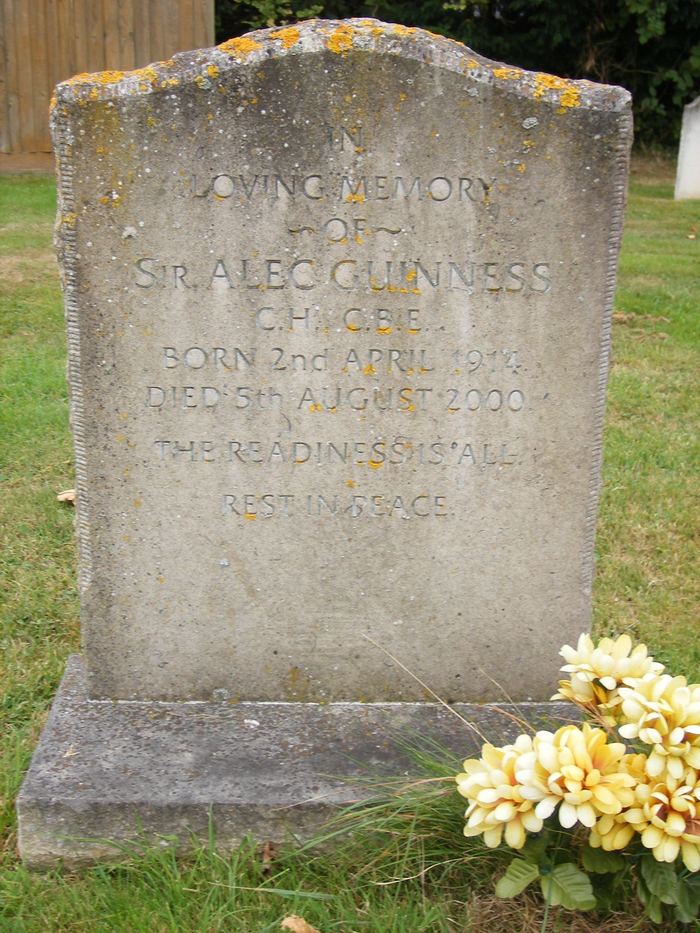Alec Guinness (Alec Guinness)

Guinness was born at 155 Lauderdale Mansions South, Lauderdale Road, Maida Vale, London as Alec Guinness de Cuffe. His mother’s maiden name was Agnes Cuff. She was born 8 December 1890 to Edward Cuff and Mary Ann Benfield. On Guinness’s birth certificate, the space for the mother’s name shows Agnes de Cuffe. The space for the infant’s name (where first names only are given) says Alec Guinness. The column for name and surname of father is blank. The identity of Guinness’s father has never been officially confirmed although it has been speculated that he may have been a member of the Anglo-Irish Guinness family. From 1875, under English law, when the birth of an illegitimate child was registered, the father’s name could be entered on the certificate only if he were present and gave his consent. Guinness himself believed that his father was a Scottish banker, Andrew Geddes (1861-1928), who paid for Guinness’s public school (in American idiom, private school) education. Geddes occasionally visited Guinness and his mother, posing as an uncle. Guinness was uninterested in his mother, who later had a short marriage to a violent, shell-shocked veteran of the Irish War of Independence.
Guinness first worked writing advertising copy. His first job in the theatre was on his 20th birthday, while he was still a drama student, in the play Libel, which opened at the old King’s Theatre, Hammersmith, and then transferred to the Playhouse where his status was raised from a walk-on to understudying two lines and his salary increased to £1 a week. He appeared at the Albery Theatre in 1936 at the age of 22, playing the role of Osric in John Gielgud’s successful production of Hamlet. 1936 also saw Guinness sign on with the Old Vic, where he was cast in a series of classic roles. During this time he worked with many actors and actresses who would become his friends and frequent co-stars in the future, including John Gielgud, Peggy Ashcroft, Anthony Quayle and Jack Hawkins. An early influence from afar was Stan Laurel, whom Guinness admired.
Guinness continued playing Shakespearean roles throughout his career. In 1937 he played Aumerle in Richard II and Lorenzo in The Merchant of Venice under the direction of John Gielgud.He starred in a 1938 production of Hamlet which won him acclaim on both sides of the Atlantic He also appeared as Romeo in a production of Romeo and Juliet (1939), Andrew Aguecheek in Twelfth Night and as Exeter in Henry V in 1937, both opposite Laurence Olivier, and Ferdinand in The Tempest, opposite Gielgud as Prospero. In 1939, he adapted Charles Dickens’ novel Great Expectations for the stage, playing the part of Herbert Pocket. The play was a success. One of its viewers was a young British film editor, David Lean, who would later have Guinness reprise his role in Lean’s 1946 film adaptation of the play. Guinness served in the Royal Navy Volunteer Reserve in World War II, serving first as a seaman in 1941 and being commissioned the following year. He commanded a landing craft taking part in the invasion of Sicily and Elba and later ferried supplies and agents to the Yugoslav partisans. During the war, he was granted leave to appear in the Broadway production of Terence Rattigan’s play Flare Path, about the RAF Bomber Command.
Guinness returned to the Old Vic in 1946 and stayed until 1948, playing Abel Drugger in Ben Jonson’s The Alchemist, the Fool in King Lear opposite Laurence Olivier in the title role, DeGuiche in Cyrano de Bergerac opposite Ralph Richardson in the title role, and finally starring in an Old Vic production as Shakespeare’s Richard II. After leaving the Old Vic, he played Eric Birling in J. B. Priestley’s An Inspector Calls at the New Theatre in October 1946. He played the Uninvited Guest in the Broadway production of T. S. Eliot’s The Cocktail Party (1950, revived at the Edinburgh Festival in 1968). His third attempt at the title role of Hamlet, this time under his own direction at the New Theatre (1951), proved a major theatrical disaster. Invited by his friend Tyrone Guthrie to join the premiere season of the Stratford Festival of Canada, Guinness lived for a brief time in Stratford, Ontario. On 13 July 1953, Guinness spoke the first lines of the first play produced by the festival, Shakespeare’s Richard III: “Now is the winter of our discontent/Made glorious summer by this sun of York.” Guinness won a Tony Award for his Broadway performance as poet Dylan Thomas in Dylan. He next played the title role in Macbeth opposite Simone Signoret at the Royal Court Theatre in 1966, a conspicuous failure. Guinness made his final stage performance at the Comedy Theatre on 30 May 1989, in the play A Walk in the Woods. In all, between 2 April 1934 and 30 May 1989, he played 77 parts in the theatre.
Guinness won particular acclaim for his work with director David Lean, which today is his best-known and most critically acclaimed work. After appearing in Lean’s Great Expectations and Oliver Twist, he was given a starring role opposite William Holden in The Bridge on the River Kwai. For his performance as Colonel Nicholson, the unyielding British POW commanding officer, Guinness won an Academy Award. Despite a difficult and often hostile relationship, Lean, referring to Guinness as “my good luck charm”, continued to cast Guinness in character roles in his later films: Arab leader Prince Feisal in Lawrence of Arabia; the title character’s half-brother, Bolshevik leader Yevgraf, in Doctor Zhivago; and Indian mystic Professor Godbole in A Passage to India. He was also offered a role in Lean’s Ryan’s Daughter (1970), but declined. At that time, Guinness had “mistrusted” Lean and considered the earlier close relationship as strained; although at his funeral, he recalled that the famed director had been “charming and affable”.
Guinness’s role as Obi-Wan Kenobi in the original Star Wars trilogy, beginning in 1977, brought him worldwide recognition by a new generation, as well as Golden Globe and Academy Award nominations. In letters to his friends, Guinness described the film as “fairy tale rubbish”, but the film’s sense of moral good – and the studio’s doubling of his initial salary offer – appealed to him, and he signed on. He was one of the few cast members who believed that the film would be a box office hit; he negotiated a deal for 2% of the gross royalties paid to the director, George Lucas, who received one fifth of the box office takings. This made him very wealthy in his later life, and he agreed to take the part of Kenobi on the condition that he would not have to do any publicity to promote the film. Upon his first viewing of the film, Guinness wrote in his diary that “It’s a pretty staggering film as spectacle and technically brilliant. Exciting, very noisy and warm-hearted. The battle scenes at the end go on for five minutes too long, I feel, and some of the dialogue is excruciating and much of it is lost in noise, but it remains a vivid experience.” However, Guinness soon became unhappy with being identified with the part, and expressed dismay at the fan-following that the Star Wars trilogy attracted. In the DVD commentary of the original Star Wars, director George Lucas says that Guinness was not happy with the script re-write in which Obi-Wan is killed. However, Guinness said in a 1999 interview that it was actually his idea to kill off Obi-Wan, persuading Lucas that it would make him a stronger character, and that Lucas agreed to the idea. Guinness stated in the interview, “What I didn’t tell Lucas was that I just couldn’t go on speaking those bloody awful, banal lines. I’d had enough of the mumbo jumbo.” He went on to say that he “shrivelled up” every time Star Wars was mentioned to him.
Although Guinness disliked the fame that followed work he did not esteem, Lucas and fellow cast members Mark Hamill, Harrison Ford, Anthony Daniels and Carrie Fisher have spoken highly of his courtesy and professionalism, both on and off the set. Lucas credited him with inspiring cast and crew to work harder, saying that Guinness contributed significantly to achieving completion of the filming. Guinness was quoted as saying that the royalties he obtained from working on the films gave him “no complaints; let me leave it by saying I can live for the rest of my life in the reasonably modest way I am now used to, that I have no debts and I can afford to refuse work that doesn’t appeal to me.” In his autobiography, Blessings In Disguise, Guinness tells an imaginary interviewer “Blessed be Star Wars”, regarding the income it provided. In the final volume of the book A Positively Final Appearance (1997), Guinness recounts grudgingly giving an autograph to a young fan who claimed to have watched Star Wars over 100 times, on the condition that the boy promise to stop watching the film, because, as Guinness told him, “this is going to be an ill effect on your life.” The fan was stunned at first, but later thanked him (though some sources say it went differently). Guinness is quoted as saying: “‘Well,’ I said, ‘do you think you could promise never to see Star Wars again?’ He burst into tears. His mother drew herself up to an immense height. ‘What a dreadful thing to say to a child!’ she barked, and dragged the poor kid away. Maybe she was right but I just hope the lad, now in his thirties, is not living in a fantasy world of secondhand, childish banalities.” Guinness grew so tired of modern audiences apparently knowing him only for his role of Obi-Wan Kenobi that he would throw away the mail he received from Star Wars fans without reading it.
Guinness died on 5 August 2000, from liver cancer, at Midhurst in West Sussex. He had been receiving hospital treatment for glaucoma, and had recently also been diagnosed with prostate cancer. He was interred at Petersfield, Hampshire. His widow, Lady Guinness, died of cancer at Petersfield, two months after her husband, also aged 86, and was interred alongside her husband of 62 years.
Born
- April, 02, 1914
- United Kingdom
- Paddington, London, England
Died
- August, 05, 2000
- United Kingdom
- Midhurst, West Sussex, England
Cause of Death
- liver cancer
Cemetery
- Petersfield Cemetery
- Petersfield East Hampshire District Hampshire, England
- United Kingdom



